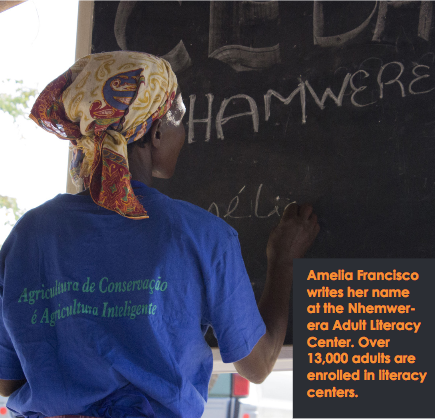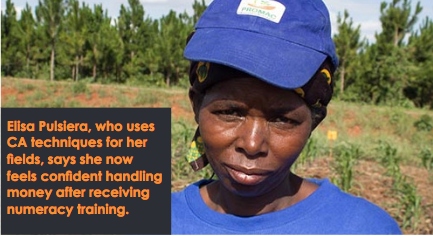 PROMAC’s methodology is based on a “learning-bydoing” approach, utilizing a Lead Farmer Extension System. The Lead Farmer Extension System has proven itself to be by far the most cost effective means of delivering quality training services to clients on a large scale. Lead Farmers are selected based on their willingness to participate, basic numeracy and literacy skills, an aptitude to adopt new technologies, and a track record of progressive thinking, as well as being geographically located to allow easy access by neighboring farmers and technicians alike. With assistance from PROMAC’s Field Assistants, Lead Farmers are responsible for maintaining demonstration plots, hosting three field days annually, and providing technical assistance to their neighboring farmers.
PROMAC’s methodology is based on a “learning-bydoing” approach, utilizing a Lead Farmer Extension System. The Lead Farmer Extension System has proven itself to be by far the most cost effective means of delivering quality training services to clients on a large scale. Lead Farmers are selected based on their willingness to participate, basic numeracy and literacy skills, an aptitude to adopt new technologies, and a track record of progressive thinking, as well as being geographically located to allow easy access by neighboring farmers and technicians alike. With assistance from PROMAC’s Field Assistants, Lead Farmers are responsible for maintaining demonstration plots, hosting three field days annually, and providing technical assistance to their neighboring farmers.
In addition, PROMAC worked to faciliate the commercialization process by linking farmers to buyers. To date, the project has facilitated the sale of $6.9 million USD in crops to local traders and agribusinesses.
Literacy Efforts Lend Female Empowerment and Access to Markets
 In the small village of Nhamwerera off the main road to Chimoio, Mozambique, a group of farmers, mostly women, sit on plastic chairs under a roof of palm fronds facing a wide chalkboard. Amélia Francisco confidently walks up with a piece of chalk and writes her name. She then continues with simple addition, goes on to explain the importance of infant nutrition and shows off a soy recipe she developed that tastes like a sweet smoothie. Two years ago, Amélia could not write her name. She is in her 30s.
In the small village of Nhamwerera off the main road to Chimoio, Mozambique, a group of farmers, mostly women, sit on plastic chairs under a roof of palm fronds facing a wide chalkboard. Amélia Francisco confidently walks up with a piece of chalk and writes her name. She then continues with simple addition, goes on to explain the importance of infant nutrition and shows off a soy recipe she developed that tastes like a sweet smoothie. Two years ago, Amélia could not write her name. She is in her 30s.
Nutrition classes are only one of the education opportunities at the Nhamwerera Center. As Amélia knows, the center, which is supported by PROMAC, also teaches adult literacy and numeracy to smallholder farmers, many of them women. Many of the women in the class are also part of the PROMAC lead farmer training program, learning to use conservation agriculture techniques in their fields. But as they get a higher yield from their crops (on average 60% higher), the holistic support from PROMAC means they won’t lose these gains at the market because they can’t read scales or keep records. These adult education classes have made them better farmers, caregivers and, ultimately, businesswomen.
“We can now control our kid’s education. I can see if they went to school, it they wrote in their notebook that day, and I now understand the report card,” said Elisa Pulseira,
a mother of six who attends another Adult Literacy and Numeracy center student up the road. But in addition to keeping an eye out for her kids, Elisa has said she has gotten more confident with business. “I can read the scale and give change. I know how to handle the money.”
Countrywide in Mozambique, there are 13,000 adult literacy and numeracy students as part of PROMAC. And with NCBA CLUSA’s 20 years of work in Mozambique, over 50,000 people have graduated from the centers, with the ability to graduate to secondary school. PROMAC has trained more than 33,000 people in conservation agriculture to date, but without the support of other literacy and numeracy training those gains in yields would not necessarily translate to gains in income or empowerment. For smallholder farmers, and especially rural women, training and education must come in all forms, in the field and for the market. And when those skills are learned, they are spread to other aspects of the community in health and the value of children’s education, building a more resilient community from farm to home.

